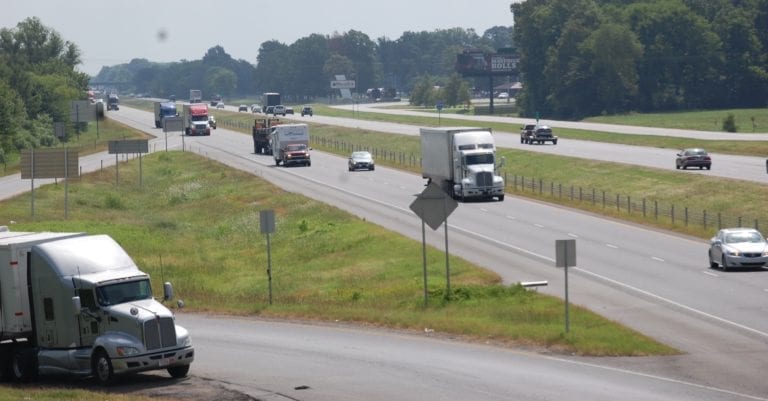GRAIN VALLEY, Mo. — Mandating the use of speed limiters set at 65 mph takes control of a commercial motor vehicle out of the hands of the driver and unnecessarily constrains small businesses, the president of the Owner-Operator Independent Drivers Association told two senators who have introduced legislation that require such devices in all CMVs to promote safety on America’s highways.
“There are countless scenarios where a driver’s expertise and discretion is needed to avoid an accident or other dangerous situations, but their abilities would be arbitrarily curtailed by speed limiters,” OOIDA President Todd Spencer said in a July 11 letter to Sens. Johnny Isakson, R-Ga., and Chris Coons, D-Del. “Rather than mandating speed limiters, the most efficient and cost-effective means to promote safer roads is simply enforcing existing speed limits, which Congress authorized states to set based on their own unique factors. Additionally, Congress should consider measures that would actually improve safety, such as enhanced training that would help drivers understand how their rate of speed affects safety.”
The legislation, S.2033) in question is called the Cullum Owings Large Truck Safe Operating Speed Act of 2019, named after Cullum Owings, who was killed by a speeding tractor-trailer during a trip back to college in Virginia after Thanksgiving in 2002.
Isakson spokeswoman Marie Gordon said making the bipartisan legislation was a top priority for him “and we’ll be working hard to demonstrate that this is a commonsense idea that will protect millions of America’s drivers.”
OOIDA says it represents the interests of owner-operators, small-business motor carriers, and professional truck drivers. It has more than 160,000 members located in all 50 states.
Spencer said the bill would not only fail to improve safety but would likely lead to more crashes involving CMVs.
“We are adamantly opposed to S. 2033 and any other federal mandate that would create a separate nationwide speed limit for CMVs,” Spencer wrote, noting that by establishing a one-size-fits-all federal mandate limiting CMVs to 65 mph, the legislation would create dangerous speed differentials between CMVs and other vehicles.
“Decades of highway research shows greater speed differentials increase interactions between truck drivers and other road users,” Spencer said. “Studies have consistently demonstrated that increasing interactions between vehicles directly increases the likelihood of crashes. Speed limiters also create dangerous driving conditions, including challenges navigating merges and running blockades (known as elephant races) that increase ‘road rage’ among other drivers. Arbitrary speed limits make it difficult for truck drivers to switch lanes to accommodate merging traffic at entrance ramps – or to merge themselves. Other drivers often react to these situations in aggressive and unpredictable ways, creating unnecessary hazards for themselves and our members.”
Spencer said speed limiting trucks also increases pressure and stress on professional drivers to complete their work.
“Truckers required to operate below the posted speed limit are forced to drive maximum hours to cover the same distance, which increases their fatigue and places even greater stress on them to comply with burdensome Hours of Service regulations,” he said. “Furthermore, our members who have used speed-limited trucks report feeling pressure to drive faster on roads where they would prefer to drive slower in order to keep their schedule.”
Speed limiting trucks also increases pressure and stress on professional drivers to complete their work, Spencer said, adding that truckers required to operate below the posted speed limit are forced to drive maximum hours to cover the same distance, which increases their fatigue and places even greater stress on them to comply with HOS.
“Furthermore, our members who have used speed-limited trucks report feeling pressure to drive faster on roads where they would prefer to drive slower in order to keep their schedule,” he said.
The two senators said another reason for introducing the legislation was to circumvent the Trump administration’s Department of Transportation, which has delayed any action on the proposed rule indefinitely as part of a sweeping retreat from regulations, which the president says slow the economy.
The rule, which didn’t propose a top speed but said the government had studied 60, 65 and 68 mph, has been at a standstill since it moved through the public comment stage in November of 2016 toward the end of the Obama administration. The next action on the rule is listed as “undetermined” on a federal website.
Spencer said even the proposed rule, a joint proposal by the Federal Motor Carrier Safety Administration and the National Highway Traffic Safety Administration, pointed out that “this joint rulemaking could put owner-operators and small fleet owners…at a disadvantage in some circumstances.”
“One remaining competitive advantage for small trucking companies over their larger competitors is the lack of a need to speed limit trucks for fleet management purposes,” Spencer said. “Instead, small trucking businesses are able to operate at the speeds determined to be safe by state officials, which in many cases is above 65 mph. Indeed, FMCSA and NHTSA concluded that as a result of losing this advantage, ‘some of the affected owner-operators would work for trucking companies as independent contractors.’”
The Trucker News Staff produces engaging content for not only TheTrucker.com, but also The Trucker Newspaper, which has been serving the trucking industry for more than 30 years. With a focus on drivers, the Trucker News Staff aims to provide relevant, objective content pertaining to the trucking segment of the transportation industry. The Trucker News Staff is based in Little Rock, Arkansas.











